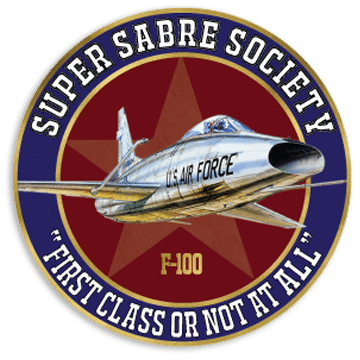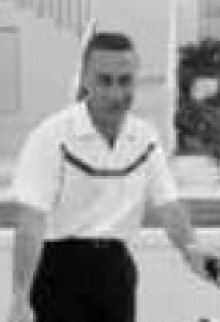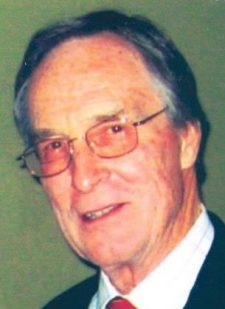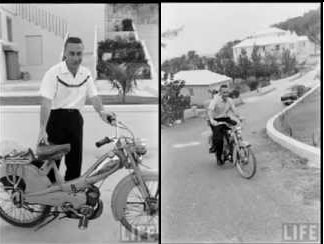Dr. Laughlin completed his premedical training at West Virginia University in 1952 and received his M.D. from the University of Maryland in 1956. After completion of internship and one year of residency in internal medicine, he served in the Air Force at Wright-Patterson AFB, Ohio, from 1957 to 1959, and was a rated flight surgeon.
In July 1960 Dr. Laughlin took a leave of absence from the University Hospitals, Cleveland, and was assigned by the NASA Office of Life Science Programs to Project Mercury, for which he developed the medical-data plan. He also assisted in establishing the medical-monitoring training program for Mercury flight controllers and served as the medical monitor at the Bermuda range station.
In addition, he has been the medical monitor of Apollo industry studies. He headed the Biomedical Branch, Life Systems Division, NASA Manned Spacecraft Center. Dr. Laughlin is a member of Alpha Omega Alpha Medical Honor Society and of the American Association for the Advancement of Science.
Carl Patrick Laughlin, MD, Flight Surgeon, “Headed West” on November 14, 2016.
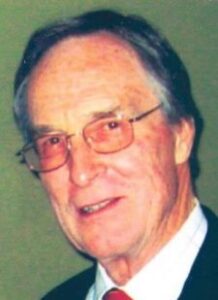 A physician for more than 50 years in Newport News and a member of the medical team for the original Mercury 7 astronauts at Langley Air Force Base, died November 14, 2016, at his home in Williamsburg from pancreatic cancer. He was 85. He was intelligent, compassionate and a consummate physician. Even in his final days, he never lost the core qualities that made him the man who was so loved and admired.
A physician for more than 50 years in Newport News and a member of the medical team for the original Mercury 7 astronauts at Langley Air Force Base, died November 14, 2016, at his home in Williamsburg from pancreatic cancer. He was 85. He was intelligent, compassionate and a consummate physician. Even in his final days, he never lost the core qualities that made him the man who was so loved and admired.
A proud Mountaineer, Dr. Laughlin was born September 28, 1931 in rural West Virginia. Dr. Laughlin graduated from West Virginia University where he was a member of Mountain, the service honorary. He then attended the University of Maryland Medical School, where he graduated Magna Cum Laude and was inducted into the medical honor society, A.O.A.
He went on to train in Internal Medicine at Case Western University and served in the Air Force as a Flight Surgeon. It was while training at Case Western that Dr. Laughlin was given the opportunity to work with NASA in the developmental stages of the space agency. He was assigned to the medical team for the original Mercury 7 astronauts at Langley Air Force Base. Dr. Laughlin was the lead medical officer for John Glenn’s orbital flight, after which he wrote the paper “Physiological Responses of the Astronaut”. An interview with Dr. Laughlin about his time with NASA is available on YouTube (Dr. Patrick Laughlin, Mercury 7 Astronaut Physician) Dr. Laughlin was a gifted, dedicated and tireless physician.
He served on the medical staff of Riverside Hospital in leadership roles and mentored residents for more than 40 years. In practice, Dr. Laughlin was a staunch defender of the private practice of medicine. He was always eager to engage with his patients, recognizing that the skill of a good diagnostician lies in the quality of the time spent with the patient. A lifelong Democrat, he also enjoyed political dialogues with patients. He always held patient care as his measure of success as a physician and saw medicine as a calling. In 1996 he was the recipient of the Virginia Chapter Laureate Award, American College of Physicians. Retiring only six months ago from his practice of Internal Medicine, he was greeted by more than 100 patients who signed his white clinic coat on his retirement day.
In addition to his practice, Dr. Laughlin had many interests and passions. He was committed to issues of social justice and environmental conservation. In the 1970’s he was quick to join with others in the opposition to an oil refinery proposed for Hampton Roads Harbor. Development of this refinery would have had devastating effects on the Chesapeake Bay and lower James River. Also in the 1970’s Dr. Laughlin became aware of the poisoning of the James, linked to the pesticide Kepone, which was being released into the James River from a plant in Hopewell, VA. Along with other concerned citizens, Dr. Laughlin worked tirelessly to protect and preserve the fragile James River.
Dr. Laughlin loved sports, particularly college level football and basketball. He was a passionate and devoted West Virginia University fan. He played football in high school, later becoming an accomplished tennis player and avid sailor. He took up golf later in life, enjoying time on the golf course with dear friends. A chance introduction to a top rated Burgundy wine in medical school was the beginning of a lifelong love and connoisseurship of wine. He enjoyed collecting wines, as well as sharing his love and knowledge of wines with friends and family. Dr. Laughlin was an avid reader who had mastered the art of speed reading. He particularly enjoyed the works of Patrick O’Brien, John LeCarré and titles pertaining to the WWII, especially the role of aviation.
Dr. Laughlin never met a cat that he did not like. He owned and loved many over the years. Most recently MeiMei, Yoshi, Beau and Hodge were his faithful companions, hardly leaving his side during his final days. Dr. Laughlin was, above all, a proud father and grandfather. In addition to his wife, Karen Kellog Laughlin, he is survived by his sons, Daniel (Kelly) and Peter (Betsy), step-daughter Kimberly (Doug)Towne, step-son Kameron (Katie) Turner, and nine grandchildren.
Donations can be made to The C. Patrick Laughlin Scholarship at West Virginia University. Checks addressed to the WVU Foundation with 2P003/C. Patrick Laughlin Scholarship in the memo section can be mailed to One Waterfront Place, 7th Floor; PO Box 1650; Morgantown, WVU 26507.
